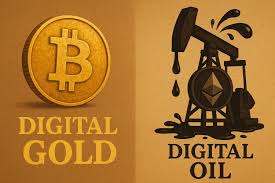When people talk about Bitcoin, it’s often called “digital gold.” That makes sense—Bitcoin is scarce, valuable, and primarily seen as a store of value, much like gold. But then the question comes: If Bitcoin is gold, what is Ethereum?
The best metaphor for Ethereum is “digital oil.” Why? Because just like oil powers the global economy by fueling machines, industries, and transportation, Ethereum powers the decentralized economy by fueling smart contracts, applications, and transactions.
Unlike Bitcoin, which mostly sits in digital wallets as a hedge against inflation, Ethereum is dynamic. Developers use it to build decentralized apps (dApps), NFTs, DeFi platforms, and countless other innovations. Every time a transaction or smart contract is executed on the Ethereum network, it requires “gas fees” — similar to how engines need oil to run.
Another way to see it: Bitcoin is about preserving value, while Ethereum is about creating and enabling value. If Bitcoin is a vault, Ethereum is the engine room of the new internet—Web3.
So while gold might sit in a safe, oil keeps things moving. And in the blockchain world, Ethereum is what keeps innovation flowing.

